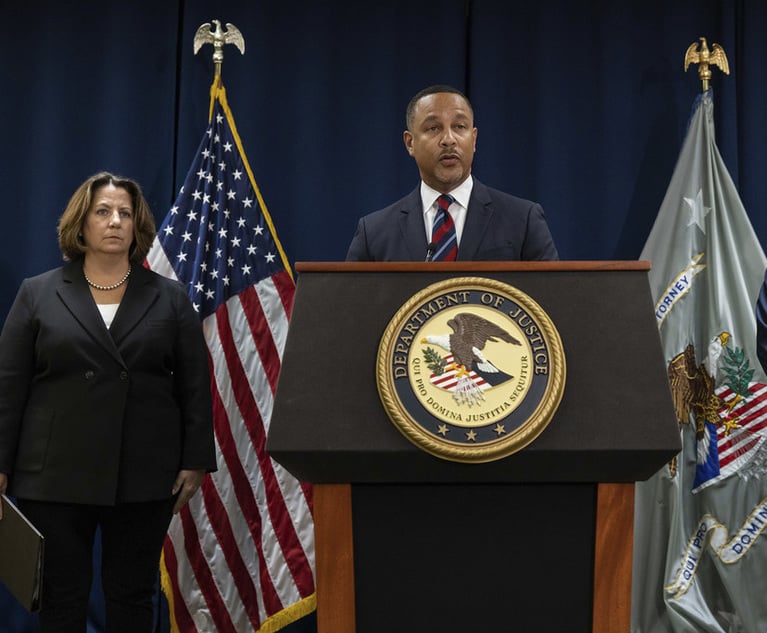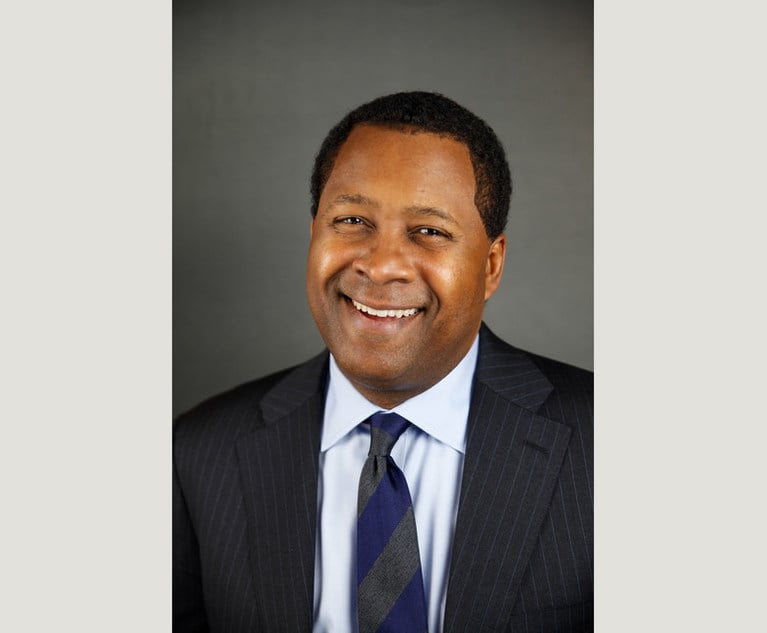Compliance Hot Spots: Kirkland's CFIUS Perspective | Squire Patton Boggs Inks Angola Contract | Goldman Tipster Must Arbitrate | SEC Names New Chief of Staff
Welcome to Compliance Hot Spots, your home for news, analysis and trends in the regulatory and white-collar arenas. Thanks for reading!
July 02, 2019 at 09:00 PM
6 minute read
Good evening from Washington—and welcome to Compliance Hot Spots, our roundup and analysis of regulatory and enforcement trends. Tips, feedback and general thoughts on your practices always appreciated. I'm C. Ryan Barber—reach me at [email protected] and 202-828-0315, or follow me on Twitter @cryanbarber. Thanks for reading!

Perspectives on CFIUS Rulemaking
Expect new regulations this fall that should clarify which types of deals must be reviewed with greater scrutiny under the nearly one-year old CFIUS reform legislation, said Kirkland & Ellis partner Mario Mancuso, who just published the 2019 edition of “A Dealmaker's Guide to CFIUS.”
The implementing rules for the Foreign Investment Risk Review Modernization Act, which was enacted into law last August, actually could come as a relief to many dealmakers who have seen transactions with China in particular plummet since the national security reviews became mandatory for certain transactions.
“Deals continue to be reviewed even absent final implementing regulations. However, the lack of final regulations is creating some uncertainty around the practical impact of FIRRMA, and a non-trivial amount of angst among clients,” said Mancuso, leader of the firm's international trade and national security practice. (Interim regulations for critical technology under a pilot program were issued last October.)
Mancuso said he understands the U.S. Treasury Department “is keen to get these published” in the fall. He doesn't anticipate any surprises but “there may be some positive developments for investors for certain countries related to mandatory declaration,” he said.
Other experts have hinted at a possible “good” list and a “bad” list of countries. Among the trends Mancuso sees: The increasing relevance of CFIUS reviews for U.S. private equity sponsors, whose funds may be considered “foreign” for CFIUS purposes, as well as increasing concern about national security risks in industries that weren't regarded as sensitive in the past, such as health care and real estate.
Meanwhile, other countries including Canada, Germany and the U.K. are strengthening their own national security review regimes, affecting U.S. and non-U.S. investors, he said. Mancuso also said the committee's $1 million civil penalty imposed last year for a company's breach of a 2016 mitigation agreement was a landmark development.
As for the drop in crossborder deal making, Mancuso said the CFIUS overhaul is not totally responsible. “CFIUS has played a role, but it is not the only factor. The drop-off has been particularly significant with respect to China, but even with respect to China, there have been other domestic Chinese factors that have negatively impacted outbound investment to the U.S,” he said. —MP McQueen

Goldman Whistleblower Must Arbitrate Claims
We got some late news today from the Southern District of New York, where a trial judge said a purported Goldman Sachs whistleblower, Christopher Collins, must take his claims to arbitration. Read the full decision here.
Collins, represented by the firms Press Koral LLP and Redniss LLC, alleged Goldman Sachs retaliated against him after he raised concerns about anti-money laundering compliance. A team from Sullivan & Cromwell represented the bank, which earlier said it would “vigorously contest” the suit.
U.S. District Judge Edgardo Ramos said Wednesday that Collins's claims are within the scope of an enforceable arbitration clause. He put the case on hold pending arbitration.

Who Got the Work
>> The Republic of Angola has hired a Squire Patton Boggs team to “bring Angola's financial system up to international standards, increase US trade and investment and enhance Angola's profile in the United States,” according to a law firm filing recently filed at the U.S. Justice Department under the Foreign Agents Registration Act. Partner Robert Kapla and senior partner Joseph Brand are the principal Squire Patton Boggs attorneys on the $4.1 million contract.
>> Huawei has assembled a group of A-list U.S. litigators to help with its legal predicaments, my colleague Anna Zhang reports. Jones Day appellate partner Glen Nager is lead counsel for the company in the federal lawsuit in Texas. He's joined on the case by his appellate partner, Ryan Watson, and Morgan, Lewis & Bockius telecom law partners Andrew Lipman and Russell Blau. Meanwhile, the company is fighting charges in the Eastern District of New York related to Iran sanctions violations. It is represented by Sidley Austin partners Michael Levy and James Cole, a former deputy U.S. attorney general under President Barack Obama, and Jenner & Block partner and former Justice Department lawyer David Bitkower.
>> Williams & Connolly partner David Zinn is representing the latest defendant accused by the Securities and Exchange Commission of participating in a scheme to steal $43 million in investor funds that were supposed to be invested in Native American tribal bonds. Zinn's client, Jason Sugarman, was charged with directing the scheme alongside Jason Galanis, who pleaded guilty to parallel criminal charges.
>> Wilmer Cutler Pickering Hale and Dorr partners Bill Paine and Bob Keefe represented State Street Bank and Trust Company as the bank resolved claims that it overcharged clients. As part of its settlement with the SEC, the bank agreed to pay a $40 million civil penalty and to disgorge almost $50 million. The SEC claimed that, from 1998 to 2015, State Street overbilled customers for custodial expenses, such as the cost of sending secured financial messages through the Society of Worldwide Interbank Financial Telecommunication, or SWIFT, network.

All the Moves & Announcements
• The SEC said that deputy chief of staff Sean Memon (above) has been promoted to chief of staff, succeeding Lucas Moskowitz. Memon, who formerly practiced at Sullivan & Cromwell, has been with the agency since May 2017. Moskowitz earlier practiced at Wilmer Cutler Pickering Hale and Dorr.
• Lee Rudofsky, senior director for global anti-corruption compliance at Walmart Inc., was nominated Monday to federal trial post in Arkansas. The Harvard Law School grad and former Washington-based Kirkland & Ellis associate recently served as solicitor general of Arkansas.
• Barnes & Thornburg has named Roscoe Howard Jr., a former U.S. attorney for the District of Columbia and a member of the firm's white-collar and investigations group, to serve as managing partner of its Washington office, my colleague Ryan Lovelace reports. Howard last year won the ZTE monitorship from the Commerce Department after the agency rescinded an offer made to Covington & Burling partner Peter Lichtenbaum.
• Hughes Hubbard & Reed said Roy (Ruoweng) Liu will chair the firm's Greater China practice as a partner in the sanctions, export controls and anti-money laundering practice. Liu had been at Hogan Lovells since 2009.
• Justin Weddle, who spent five years at Brown Rudnick after a 15-year career at the Justice Department, launched his own New York boutique last month. His two-lawyer firm also includes former Brown Rudnick associate Julia Catania.
• Russell Duncan, the former head of the white-collar defense group at Shulman Rogers, has joined Clark Hill PLC as a partner.
This content has been archived. It is available through our partners, LexisNexis® and Bloomberg Law.
To view this content, please continue to their sites.
Not a Lexis Subscriber?
Subscribe Now
Not a Bloomberg Law Subscriber?
Subscribe Now
NOT FOR REPRINT
© 2025 ALM Global, LLC, All Rights Reserved. Request academic re-use from www.copyright.com. All other uses, submit a request to [email protected]. For more information visit Asset & Logo Licensing.
You Might Like
View All
Compliance Hot Spots: GOP Eyes ESG as an Antitrust Issue + Another DOJ Crypto Seizure + Sidley Partner Jumps to Main Justice
9 minute read
Compliance Hot Spots: Lessons from Lafarge + Fraud Section Chief Talks Compliance + Cravath Lands FTC Commissioner
11 minute readTrending Stories
Who Got The Work
J. Brugh Lower of Gibbons has entered an appearance for industrial equipment supplier Devco Corporation in a pending trademark infringement lawsuit. The suit, accusing the defendant of selling knock-off Graco products, was filed Dec. 18 in New Jersey District Court by Rivkin Radler on behalf of Graco Inc. and Graco Minnesota. The case, assigned to U.S. District Judge Zahid N. Quraishi, is 3:24-cv-11294, Graco Inc. et al v. Devco Corporation.
Who Got The Work
Rebecca Maller-Stein and Kent A. Yalowitz of Arnold & Porter Kaye Scholer have entered their appearances for Hanaco Venture Capital and its executives, Lior Prosor and David Frankel, in a pending securities lawsuit. The action, filed on Dec. 24 in New York Southern District Court by Zell, Aron & Co. on behalf of Goldeneye Advisors, accuses the defendants of negligently and fraudulently managing the plaintiff's $1 million investment. The case, assigned to U.S. District Judge Vernon S. Broderick, is 1:24-cv-09918, Goldeneye Advisors, LLC v. Hanaco Venture Capital, Ltd. et al.
Who Got The Work
Attorneys from A&O Shearman has stepped in as defense counsel for Toronto-Dominion Bank and other defendants in a pending securities class action. The suit, filed Dec. 11 in New York Southern District Court by Bleichmar Fonti & Auld, accuses the defendants of concealing the bank's 'pervasive' deficiencies in regards to its compliance with the Bank Secrecy Act and the quality of its anti-money laundering controls. The case, assigned to U.S. District Judge Arun Subramanian, is 1:24-cv-09445, Gonzalez v. The Toronto-Dominion Bank et al.
Who Got The Work
Crown Castle International, a Pennsylvania company providing shared communications infrastructure, has turned to Luke D. Wolf of Gordon Rees Scully Mansukhani to fend off a pending breach-of-contract lawsuit. The court action, filed Nov. 25 in Michigan Eastern District Court by Hooper Hathaway PC on behalf of The Town Residences LLC, accuses Crown Castle of failing to transfer approximately $30,000 in utility payments from T-Mobile in breach of a roof-top lease and assignment agreement. The case, assigned to U.S. District Judge Susan K. Declercq, is 2:24-cv-13131, The Town Residences LLC v. T-Mobile US, Inc. et al.
Who Got The Work
Wilfred P. Coronato and Daniel M. Schwartz of McCarter & English have stepped in as defense counsel to Electrolux Home Products Inc. in a pending product liability lawsuit. The court action, filed Nov. 26 in New York Eastern District Court by Poulos Lopiccolo PC and Nagel Rice LLP on behalf of David Stern, alleges that the defendant's refrigerators’ drawers and shelving repeatedly break and fall apart within months after purchase. The case, assigned to U.S. District Judge Joan M. Azrack, is 2:24-cv-08204, Stern v. Electrolux Home Products, Inc.
Featured Firms
Law Offices of Gary Martin Hays & Associates, P.C.
(470) 294-1674
Law Offices of Mark E. Salomone
(857) 444-6468
Smith & Hassler
(713) 739-1250










